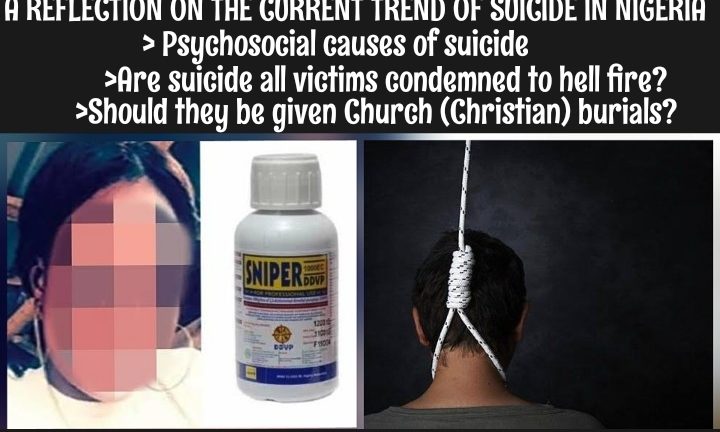Suicide is a sad and often a difficult topic. It has grown rapidly over the years, with an alarming increase across the globe. In Nigeria, the rate of suicide has reportedly increased geometrically; as such, its awareness has become “visible to the blind, and audible to the deaf”. In fact, on July 29, 2018, “Spectator Index” published a World Health Organization research that ranked suicide per 100,000, per country; unfortunately, Nigeria is placed as the fifth on annual suicide list, with 15,000 suicide in every 100,000 suicides across the globe.
Regrettably, in recent times, there has been a host of Sniper-Related Suicides – death prowling on the streets. Put differently, in Nigeria, Sniper, which is an insecticide seems to be serving another purpose. For clarity sake, “Sniper, is a DDVP, 2,2-Dichlorovinyl dimethyl phosphate compound, marketed in Nigeria by Swiss-Nigerian Chemical Company, as a synthetic organophosphorus”, but which many Nigerians have converted to an indoor insecticide. It is disconsolate that there are many cases of those who have consumed the insecticide in a bid to take their lives, while a majority have died, a few have survived. This issue becomes more perturbing because bottles of sniper can be picked up easily on the streets as they are sold openly in the market. This explains why many cases of suicides reported in recent months are carried out through the use of this substance; however, some are unreported. Sadly, today in Nigeria, sniper is now synonymous with suicide; put differently, the first thing that comes to people’s mind in relation to “Sniper” is suicide; thus, making it as dangerous as a “Viper”.
Having established this backdrop, it is pertinent to state that there are a host of factors associated with suicide. Among today’s youth, suicide is usually related to the disappointment of love or social rejection. When young people kill themselves, they are often expressing violence against another person; in this case, suicide becomes a form of “revenge on others” because of rejection or mistreatment. Considering the responsible factors, research has revealed that 95% of people who die by suicide have a psychological disorder at the time of death. This psychological disorder reveals itself in depression, bipolar disorder, feelings of distress, irritability, or agitation, feelings of hopelessness and worthlessness that often accompany depression, a family history of depression or suicide, emotional, physical, or sexual abuse – which often leads to depression. Other factors include: a previous suicide attempt, lack of a support network, poor relationships with parents or peers, and feelings of social isolation, drug/alcohol abuse, dealing with one’s sexual orientation in a society/culture where it is not welcomed, vulnerability, lack of attention/care, imitation, radical religious views wrongly conceived, strongly hedonistic view of life, being carried away by the “false reality” of the internet (social media), etc.
While many people see these suicide victims as failures who could not control their emotions, others see them as worst sinners and candidates of hell who have sinned greatly against the author of life (God). Just last month, while some friends asked me to write on this issue and the position of the Catholic Church, other friends questioned: “Father, but if truly they are Christian at heart, why will they take their lives?” “Father, will suicide victims go to heaven?”, “Father, I believe they’ve gone straight to hell for taking their lives”, “Father, since some of them had been denied Christian burials, it means they’re roasting in hell”, “Father, I have witnessed a case where the suicide victim was denied church burial and was treated like an outcast, why? Is it because, their sin (suicide is known)? What about those whose sins are unknown, yet they are given Church burial?” The questions are endless. In this light, we ask: what does the Church teach about suicide?
Once upon a time, in the history of the Catholic Church, suicide was considered a grave crime. Put differently, for most of the Church’s history, the Church has taught that suicide is a sin against God that has dire penalties. It cannot be denied that in the past, those who committed suicide were unable to be buried in Catholic cemeteries or receive a funeral Mass. The reason is that it was believed that suicide is a grave offence against life and so the person was likely to have committed a mortal sin. Having a Catholic funeral mass and burial in a Catholic cemetery would be a contradiction and hence may be a cause for scandal. It is also out of this belief that some Catholics would believe a person committing suicide would go straight to hell.
Nevertheless, with a heightened understanding of mental illness, stress, and emotional distress, the Church’s positioned was softened. Beginning in the 1960s Catholics who had taken their own lives were permitted to receive a Catholic funeral and be buried in Catholic cemeteries. Thus, without prejudice to the sanctity of the human life, and the place of man “as stewards, not owners of the life God has entrusted him” (CCC 2280), we must state that, although suicide is indeed an offence against life, and also against the fifth commandment of God; however, the person committing suicide may not, in fact, be capable of making the decision with full freedom. Increasingly, we see from clinical and pastoral evidence that in a great majority of cases of suicide, the person has suffered from some form of depression or mental illnesses, and thus, committed suicide without full freedom. Therefore, without full freedom, there is no full consent, and in such a case, a grave wrong cannot be judged as a mortal sin. In fact, in the case of severe depression or mental illnesses, it would be doubtful if it can be considered a sin at all, since the person has lost control over his own thoughts and actions. Additionally, even for someone who intended to commit suicide consciously, there is no telling that the person might not have repented a few seconds before he/she died. There have been cases of suicide survivors who narrate the traumatic ordeal they went through, just few moments before they were rescued from death – the feelings of regrets, sorrow, repentance, etc… Hence, it would, therefore, be presumptuous on our part to judge such a person would be in hell.
Consequently, during the tenure of Pope John Paul II and for the first time, the Catechism of the Catholic Church acknowledged that “Grave psychological disturbances, anguish, or grave fear of hardship, suffering, or torture can diminish the responsibility of the one committing suicide.” It adds, “we should not despair of the eternal salvation of persons who have taken their own lives. By ways known to him alone, God can provide the opportunity for repentance. The Church prays for persons who have taken their own lives.” (CCC 2283). As a result, the Church today no longer places such restriction on the funeral and burial of a person who committed suicide. Priests are instructed to pay special care in such cases to comfort the family, and not to deny the person the full benefits of a Catholic funeral. At any rate, we must never condemn such a person to hell, but always have hope in the power of God’s mercy, for He alone knows the depth of each person’s soul, and He would never allow a person to perish without the full benefit of His mercy. However, we must not forget the aspect of the Catechism of the Catholic Church that states that: “if suicide is committed with the intention of setting an example, especially to the young, it also takes on the gravity of scandal. Voluntary co-operation in suicide is contrary to the moral law.” (CCC 2282)
In view of all these, we must also remember that God is the giver of all life. Each of us has been made in God’s image and likeness (cf. Genesis 1:27) with both a body and a soul. Therefore, life is sacred from the moment of conception until natural death. Anyone struggling with thoughts of depression and suicide should kindly seek help and those of us around them should offer it without judgment. Ignorance of the dangers of depression might be a cause for lack of attention. If one does not know what depression is and that he/she needs help to treat or manage it, he/she sees suicidal thoughts as the only option.
While we congratulate those already educating people on mental health/depression, we need more hands on deck; more educators on depression, especially via the social media, schools, family, peer group, societal and religious levels. Let us take it upon ourselves to check on one another regularly (even in the midst of our busy schedule). Do not say, “he/she hasn’t checked on me, so I won’t bother checking on him/her as well”.
Above all, for anyone suffering from any mental illness – depression, or has suicidal thoughts, please know that you are not alone. On my part as a religious leader, I intend to give my wholehearted attention to you and equally refer you to other organizations/units for a better therapeutic measure.
God bless you…
Shalom!





Thanks so very much Fr Cjay for this wonderful write up.its well explained and I
pray it will really change our mind sets on sucide issues.. Remain ever blessed.